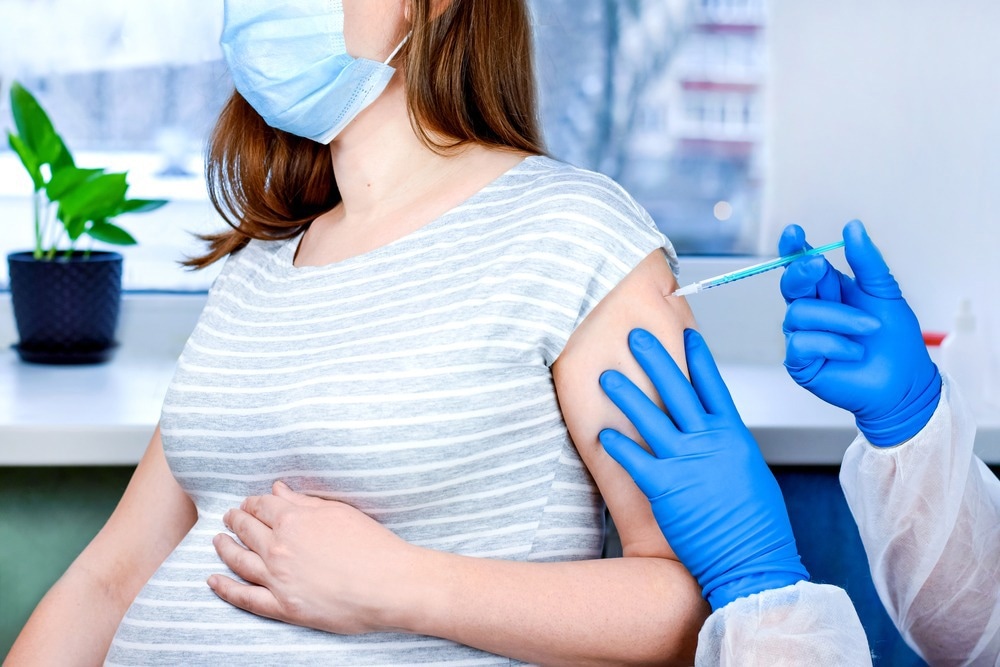The emergence and rapid outbreak of the severe acute respiratory syndrome coronavirus 2 (SARS-CoV-2) resulted in the coronavirus disease 2019 (COVID-19) pandemic. Throughout the COVID-19 pandemic, scientists have worked rapidly to develop numerous vaccines, several of which received emergency use authorization from global regulatory bodies, such as the United States Food and Drug Administration (FDA).
Study: Longitudinal antibody response kinetics following SARS-CoV-2 messenger RNA vaccination in pregnant and nonpregnant persons. Image Credit: Marina Demidiuk / Shutterstock.com
Background
Generally, pregnancy triggers an immunogenic shift to a Th2-mediated immunity, which could also lead to a differential reaction to infection in this patient population. SARS-CoV-2 infection has been associated with adverse pregnancy outcomes, including maternal death, preterm delivery, stillbirth, mechanical ventilation, and maternal intensive care unit (ICU) admission.
Although COVID-19 vaccination has been recommended for pregnant women, there remains a lack of data available regarding its efficacy in this group. This is primarily due to the exclusion of pregnant women from initial COVID-19 messenger RNA (mRNA) vaccine trials.
Nevertheless, a robust maternal immune response has been reported after vaccination with mRNA-lipid nanoparticle (LNP) COVID-19 vaccines. In addition, compared to nonpregnant individuals, pregnant women exhibited a differential response to some vaccinations across gestational ages.
Therefore, it is imperative to understand whether the immunologic milieu of pregnancy affects the longitudinal vaccine response to mRNA-based immunization. Furthermore, the long-term efficacy and kinetics of antibody responses induced after vaccination between pregnant and nonpregnant women should be further elucidated.
About the study
A recent American Journal of Obstetrics Gynecology MFM study evaluated the longitudinal antibody response kinetics associated with two doses of mRNA-LNP-based SARS-CoV-2 vaccines developed by Pfizer-BioNTech (BNT162b2) or Moderna (mRNA-1273) in pregnant women across different gestational ages. All participants received vaccines between December 18, 2020, and June 26, 2021.
The vaccine-induced antibody response in pregnant women was compared with that of nonpregnant individuals. To this end, blood samples were collected from participants at different time points, including the time of the first (t0) and second vaccine doses (t1), two weeks after the second vaccine dose (t2), and serial longitudinal follow-up up to 41.7 weeks after administration of the first vaccination dose.
Enzyme-linked immunosorbent assay (ELISA) was conducted to determine the presence of anti-spike (S) immunoglobulin M (IgM), IgG, and IgA in participants’ blood samples. Participants with a history of SARS-CoV-2 infection, based on the presence of anti-nucleocapsid antibodies, were excluded from the current study. Pregnant women who received the booster vaccine dose and those who were not fully vaccinated with two-doses by the time of delivery were also excluded.
Study findings
A total of 53 pregnant women were included in the study. The nonpregnant cohort included data from 21 participants, whose median age was 36 years. None of the participants from this group reported immunosuppressed conditions nor were they taking immunosuppressing medication.
All pregnant study participants delivered liveborn infants between April 13, 2021, and November 29, 2021. Umbilical cord blood samples were collected from 49 patients and were analyzed.
None of the participants were immunosuppressed nor were they under immunosuppressing medication. The median maternal age was 35 years and gestational ages during vaccine administration and delivery were 26.3 weeks and 39.6 weeks, respectively.
The anti-S IgA, IgG, and IgM responses at t1 and t2 were not significantly associated with the gestational age at immunization. Thus, the anti-S responses in pregnant participants were independent of gestational age.
A comparison of different immune responses between pregnant and nonpregnant participants revealed that IgM levels were significantly higher in the nonpregnant cohort at t2. Additionally, an elevated IgA response was also noted in the nonpregnant cohort at t1 and t2. No significant difference in IgG responses was observed in the cohorts.
Notably, the highest level of antibody responses occurred two weeks after the second vaccine dose for both cohorts. A decline in anti-S IgG, IgM, and IgA levels was observed over time, with a similar pattern reported in both pregnant and nonpregnant individuals. Maternal anti-S IgG levels were similar to umbilical cord anti-S IgG levels.
Conclusions
The current study demonstrates that the immunologic milieu of pregnancy has no effect on the durability of the anti-S IgG response to COVID-19 vaccination. At present, scientists are studying the clinical implications of low levels of vaccine-induced IgA and IgM response in pregnant persons and whether this difference in immune response affects pregnant women.
The authors strongly recommend COVID-19 vaccination at any point during pregnancy, as it should protect not only the mother but also the child through robust passive antibody transfer.
Journal reference:
- Prabhu, M., Yang, Y. J., Johnston, C. D., et al. (2023) Longitudinal antibody response kinetics following SARS-CoV-2 messenger RNA vaccination in pregnant and nonpregnant persons. American Journal of Obstetrics Gynecology MFM, 5(2). doi:10.1016/j.ajogmf.2022.100796
